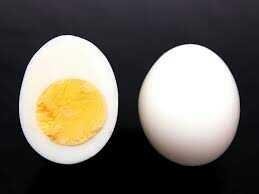Benefit of Egg

Eggs are among the few foods that I would classify as "superfoods."
They are loaded with nutrients, some of which are rare in the modern diet.
Here are 10 health benefits of eggs that have been confirmed in human studies.
Eggs Are Incredibly Nutritious
Eggs are among the most nutritious foods on the planet.
A whole egg contains all the nutrients required to turn a single cell into a baby chicken.
A single large boiled egg contains (1):
Vitamin A: 6% of the RDA
Folate: 5% of the RDA
Vitamin B5: 7% of the RDA
Vitamin B12: 9% of the RDA
Vitamin B2: 15% of the RDA
Phosphorus: 9% of the RDA
Selenium: 22% of the RDA
Eggs also contain decent amounts of Vitamin D, Vitamin E, Vitamin K, Vitamin B6, Calcium and Zinc
This is coming with 77 calories, 6 grams of protein and 5 grams of healthy fats.
Eggs also contain various other trace nutrients that are important for health.
Really... eggs are pretty much the perfect food, they contain a little bit of almost every nutrient we need.
If you can get your hands on pastured or Omega-3 enriched eggs, then these are even better. They have more Omega-3s and are much higher in Vitamin A and E (2, 3).
Eggs Are High in Cholesterol, but They Don't Adversely Affect Blood Cholesterol
It is true that eggs are high in cholesterol.
In fact, a single egg contains 212 mg, which is over half of the recommended daily intake of 300 mg.
However... it's important to keep in mind that cholesterol in the diet doesn't necessarily raise cholesterol in the blood (4, 5).
The liver actually produces large amounts of cholesterol every single day. When we eat more eggs, the liver just produces less cholesterol instead, so it evens out (6, 7).
The response to egg consumption varies between individual (8):
In 70% of people, eggs don't raise cholesterol at all
In the other 30% (termed "hyper responders"), eggs can mildly raise Total and LDL cholesterol
However, as I will outline later in the article, the situation is a bit more complicated than that and these changes are actually beneficial.
(Exceptions... people with genetic disorders like familial hypercholesterolemia or a gene type called ApoE4 may want to minimize or avoid eggs.).
Eggs Raise HDL (the "Good") Cholesterol
HDL stands for High Density Lipoprotein. It is often known as the "good" cholesterol (9).
People who have higher levels of HDL usually have a lower risk of heart disease, stroke and various health problems (10, 11, 12, 13).
Eating eggs is a great way to increase HDL.
In one study, 2 eggs per day for 6 weeks increased HDL levels by 10% (14, 15, 16).
Eggs Contain Choline — an Important Nutrient That Most People Don't Get Enough Of
Choline is a nutrient that most people don't even know exists.
Yet, it is an incredibly important substance and is often grouped with the B vitamins.
Choline is used to build cell membranes and has a role in producing signalling molecules in the brain, along with various other functions (17).
Dietary surveys have shown that about 90% of people in the U.S. are getting less than the recommended amount of choline (18).
Whole eggs are an excellent source of choline. A single egg contains more than 100 mg of this very important nutrient.
**Eggs Turn LDL Cholesterol From Small, Dense to Large, Linked to a Reduced Risk of Heart Disease
**
LDL cholesterol is generally known as the "bad" cholesterol.
It is well known that having high levels of LDL is linked to an increased risk of heart disease (19, 20).
But what many people don't realize is that there are subtypes of LDL that have to do with the size of the particles.
There are small, dense LDL particles and then there are large LDL particles.
Many studies have shown that people who have predominantly small, dense LDL particles have a higher risk of heart disease than people who have mostly large LDL particles (21, 22, 23).
Even if eggs tend to mildly raise LDL cholesterol in some people, studies show that the particles change from small, dense to large LDL... which is a good thing (24, 25).
thanks for voting me
Hi! I am a robot. I just upvoted you! I found similar content that readers might be interested in:
https://www.healthline.com/nutrition/10-proven-health-benefits-of-eggs
Having read your article I will think of eggs in a completely different light next time I eat an egg. There seem to be pros and cons but many more benefits than not.